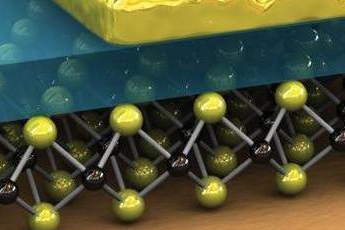Super silicon successor spotted?
A mineral called molybdenite could consume 100,000 times less energy in standby state than traditional silicon transistors.


Even tinier and more energy efficient computer chips could be created through the use of a potential silicon successor called molybdenite.
Many thought graphene would be the next ideal material for superconductors and electronic chips.
The discovery of that material earned University of Manchester physicists Andre Geim and Konstantin Novoselov the 2010 Nobel Prize in Physics and no doubt those responsible for the discoveries made around molybdenite will be hoping for something similar.
Research carried out in the Laboratory of Nanoscale Electronics and Structures (LANES) has found molybdenite, or MoS2, is a particularly effective semiconductor.
Researchers said it could be used to make transistors that consume 100,000 times less energy in standby state than traditional silicon transistors. The mineral is often found in steel alloys or as an additive in lubricants.
Ecole Polytechnique Federale de Lausanne's Professor Andras Kis, one of the leaders of the study alongside LANES colleagues, told IT PRO that molybdenite would be a better semiconductor than graphene.
Graphene is not actually a semiconductor and whilst you can force it to behave like one, it takes considerable effort and force, Kis said.
Get the ITPro daily newsletter
Sign up today and you will receive a free copy of our Future Focus 2025 report - the leading guidance on AI, cybersecurity and other IT challenges as per 700+ senior executives
"The advantage is that MoS2 is a semiconductor (it has an energy gap), just like silicon," the professor explained. "Even then when you make a transistor out of it, it does not turn off as completely as our transistor based on MoS2."
It is considerably easier to produce transistors if the manufacturer can start with a semiconductor than if you take a material and then turn it into a semiconductor, Kis added.
Molybdenite is one of the main mineral sources of molybdenum, which can be mined in numerous places across the earth, including Ontario, Quebec, Arizona, Utah, Mexico and France.
Kis was quick to rubbish reports that have stated silicon is a rare-earth metal, only mined in China.
"That's of course nonsense - silicon is one of the most abundant elements on earth and is found, for example, in sand," he added.
Elsewhere in the future computing world, researchers recently took the world a step closer to quantum systems.
They managed to generate 10 billion bits of quantum entanglement in silicon for the first time. Entanglement between the electron and the nucleus of an atom is a key part of making quantum computers.
Tom Brewster is currently an associate editor at Forbes and an award-winning journalist who covers cyber security, surveillance, and privacy. Starting his career at ITPro as a staff writer and working up to a senior staff writer role, Tom has been covering the tech industry for more than ten years and is considered one of the leading journalists in his specialism.
He is a proud alum of the University of Sheffield where he secured an undergraduate degree in English Literature before undertaking a certification from General Assembly in web development.
-
 Bigger salaries, more burnout: Is the CISO role in crisis?
Bigger salaries, more burnout: Is the CISO role in crisis?In-depth CISOs are more stressed than ever before – but why is this and what can be done?
By Kate O'Flaherty Published
-
 Cheap cyber crime kits can be bought on the dark web for less than $25
Cheap cyber crime kits can be bought on the dark web for less than $25News Research from NordVPN shows phishing kits are now widely available on the dark web and via messaging apps like Telegram, and are often selling for less than $25.
By Emma Woollacott Published